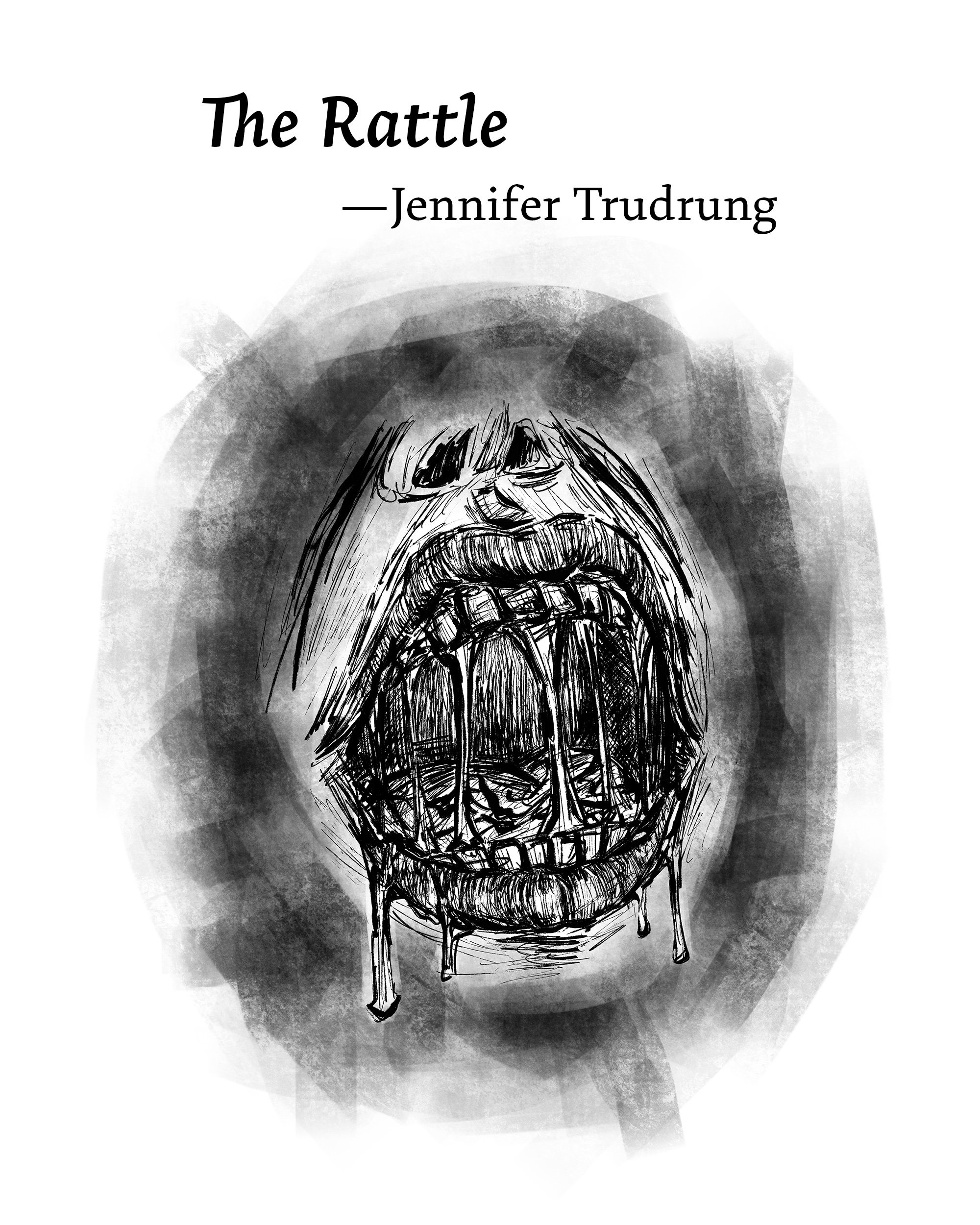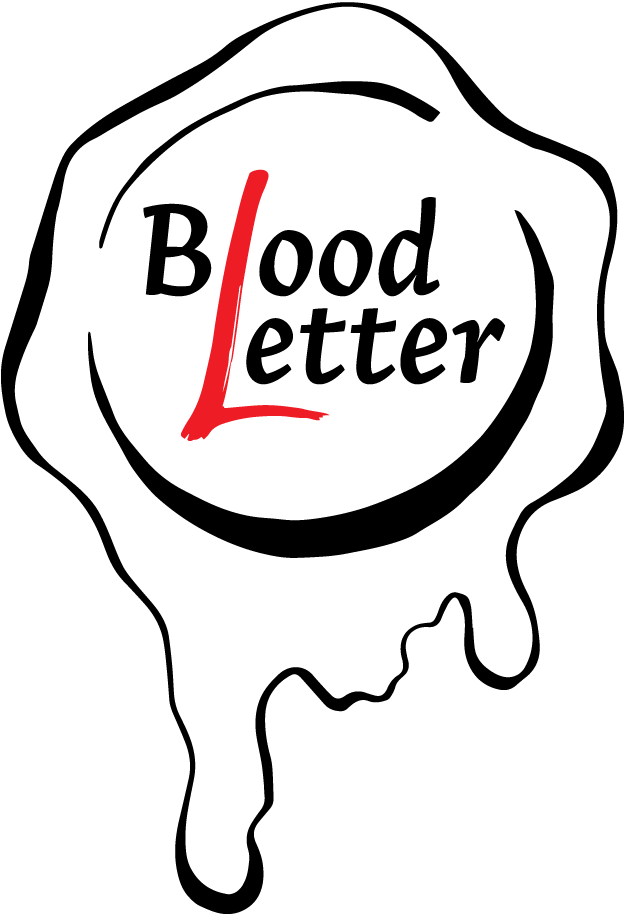The Rattle

The phone call from her mom took her by surprise. Laura felt sinking panic mixed with cold disbelief, which together formed a strange semblance of calm as she exited the highway and turned her car towards the care home.
Her mom liked to gloss over things. She projected the beatific simplicity of sunshine and baby animals and denied any hard-doings, even as she dealt with an increasingly difficult and at times verbally abusive partner. Laura had begged her for years to get help, as she saw the toll taking care of her dad had on her mom as he descended into paranoia, anger, fear, and, eventually, childlike simplicity and incontinence.
They tried not to use the term “Alzheimer’s,” as there really wasn’t any way to know that for certain until after a brain autopsy. Laura’s mom flat-out refused to even discuss it as a possibility. Her beloved of 40 years was being buried: “all of him, not an ounce dissected or missing.”
When Laura’s dad was placed into the care facility, he didn’t seem to notice. He embraced the small room, wheelchair, and steady routine. When Laura came to visit him, she would play Johnny Cash’s “Folsom Prison Blues,” comb crumbs of stale crackers out of his beard, and try to flatten his disheveled, thinning cowlicks. She’d put coconut scented lotion on his dry hands, teasing him about his long fingernails, which he refused to let anyone trim. He’d resist by pulling away his hand at first, then settle in and relax, murmuring, “that feels nice.”
Her mom was by his side everyday. She brought him chocolate, fed him his meals, and won over the entire staff with her effusive bubbly and chummy disposition. She would sit beside his wheelchair and hold his hand while she pretended he was watching football or animal videos. He would sleep frequently.
Time passed and her dad became even more docile, more infantile and Laura cried as she finally acknowledged the lack of recognition in his eyes when she came to visit him. Her mom, however, said he always knew her when she walked in, glossing over the confused smile he wore when she kissed him and straightened the blanket over his wasted legs.
Then today, the phone call from her mom. “Your dad is struggling to breathe.”
Laura locked her car, dashed through the double doors and signed in at the front desk. The receptionist gave her a forlorn smile when she wrote down which patient she was visiting.
As Laura walked into his room and saw her dad surrounded by nurses, an oxygen mask on his face, his eyes rolling, his body twitching, and her mom standing off to the side watching, something broke. Her grief tore her open and allowed something ancient and waiting to make a nest there. This Something lived in the dark cracks of places like this. Places where people came to die and where loss drifted in the thick air. Laura didn’t realize it at first, but later, she remembered her hand clutching her throat, the click of a pain filled swallow. But, by then, of course, it was too late.
The nurses were able to calm her dad by administering morphine and increasing his oxygen levels but they were clear that this was it. Laura and her mom settled in to wait and say their goodbyes.
Laura and her dad were close, and she loved him but like most families, their relationship was complicated. He had been exceedingly loving to her but also volatile and difficult in his expectations of her and she had felt the bite of his words enough to realize, as a docile people-pleaser, she had been emotionally abused. But he had also been fun with a sharp wit and they had enjoyed trying to outsmart each other with silly puns and stories as Laura had gotten older and before the dementia set in.
Laura grieved. She held his hand, whispered in his ear how much she loved him, how good a dad he had been, that she would miss him as his eyes flickered from her face to the wall, his oxygen mask fogging with each rapid breath.
Each time his eyes drifted to her face, Laura hoped that somehow the dying process would give him clarity. That he would again know who she was, that her words weren’t empty nothings, that she was, in the end, connecting with him.
Soon, it was night. Laura sat in a chair facing her dad while her mom sat in a chair beside his bed. His breathing had grown shallower since the nurses removed his oxygen mask in the middle of the night.
With each breath, there came a wet rattle that Laura found increasingly disturbing. She wondered if it was the infamous “death rattle,” but was afraid to ask in front of her mom. Finally, worried that he might be choking, she flagged down a passing nurse.
The nurse said that the rattle happened when someone is no longer able to swallow but that her dad wasn’t in any discomfort or pain. It was just something that happened when a person was
dying. The nurse said she could suction out some of the saliva,which would lessen the rattle if Laura wanted, and Laura said, “Yes.”
The nurse rolled in a large industrial looking machine, plugged it in and stuck a plastic tube deep in her dad’s throat. The tube made a loud buzzing noise and her dad seemed to grimace which upset her mom. The nurse shrugged at Laura as she left the room and Laura’s mom tucked his blanket around his chin and held his hand.
They sat in silence, other than her mom’s occasional whispering of, “I love you. You can let go now” and the consistent gurgling rattle.
Laura bit her nails. She envisioned her dad’s throat. She saw the pool of phlegm and spittle hovering at his epiglottis. The stringy lines of saliva flecking back and forth as the air struggled from his dying lungs. She shut her eyes hard, opened them, took a drink from her water bottle, swallowed. The water went down her airway and she bolted forward, coughing. Her mom gazed at her, sad and exhausted.
“You okay?” she asked.
Laura nodded as she frantically coughed. Tears and snot streamed down her face as she tried to laugh off the fit. At least I can’t hear the rattle, she thought, as she tried to calm her breathing. Her mom came over and smacked her on the back, which made Laura cough more. “I’m okay,” Laura gasped. Her mom nodded and moved back to her seat.
Laura took in a long, shaky breath and exhaled. “Better,” she said. Laura’s mom gave a distracted smile, her attention back to her dad. Laura took another, more careful sip from her water bottle.
Silence again, other than the death rattle. The saliva and bronchial fluids danced while his muscles spasmed. Laura coughed again, this time noticing the wetness at the back of her own throat. She cleared her throat.As she swallowed, her lungs made a thrumming sound.
Laura glanced to see if her mom had noticed the sound, but her head was buried in her arms on the bed. The rattle became louder as her dad’s breathing became more labored. Laura coughed and jerked in surprise when beads of spittle-stained her jeans. She stared at them and wiped her mouth.
Her hand came away wet. Laura stood up and moved to a small wooden table where a nurse had empathetically left a box of tissues beside the stuffed bear her dad had liked to hold. Laura grabbed a tissue.
“Laura?” her mom called. Laura wiped her mouth and held up her hand to signal, just a sec. She swallowed and gagged, her mouth filling with saliva and phlegm. She jerked and ran into the bathroom, spitting into the sink.
She wiped frantically at her mouth and gazed at the pink-stained spit and mucus that slowly dripped down the drain. Laura stared at her face in confusion. She tried to swallow and gagged again on a wad of phlegm.
She bent over the sink again, fluid splashing against the sink and splattering the mirror and wall. Laura jumped as her mom gripped her shoulder. “What’s going on, sweetie?” Laura swayed on her feet and lifted her head, goo dripping off her chin. Laura tried to say something, but fluid filled her mouth and she gurgled and sputtered.
“He loved you, Laura, so much.” Her mom rubbed her shoulder. Laura coughed and tried to breathe; her lungs begged her for air, and she clawed at her mom. At the same time,
Laura saw her reflection in the mirror calmly smile and say, “I know. I love him too. I’m just really sad.” Laura shook her head, spraying spittle, and struck the mirror where her reflection gazed at her, amused.
A loud gurgling rattle filled the air, then silence. Laura’s mother put her hand over her mouth, her eyes filling with tears. Laura’s reflection nodded at her mother, “Go. It’s almost time.” Her mother kissed her cheek and left the room. Another deep, dragging rattle sounded as Laura’s reflection knelt closer to where Laura frantically struck at her own chest and back, desperately trying to dislodge the flood of saliva and draw in a breath.
Ancient black eyes gazed at her in adoration and hunger. A taloned finger stroked Laura’s blue-hued face as she fell to the floor – her own death rattle keening.
Something with Laura’s face walked out of the bathroom and approached the mother. The mother stroked the father’s still face in the now silent hospital room. The mother shakily looked up and said, “He’s gone.” Something moved to the side of the bed and gazed at the empty shell of skin, bones, and meat. It ran its fingers through the gray cowlicks and felt the rising coolness of the scalp under its nails.
Two caretakers walked into the room. They hugged the mother and patted Something’s shoulders. The mother signed some documents and gave them the name of the funeral home to which the father’s body should be taken. The caretakers promised to take care of him, to prepare him with kindness and respect, for his final ride.
The mother looked around the small room, the photos on the wall above the bed, the father’s clothes hanging in the closet, the stuffed bear he had slept with at night. Something said, “We’ll take care of it all tomorrow,” and the mother looked at Something gratefully.
The mother kissed the father one last time as Something gazed at the mother’s frail back, arthritic hands, and softly beating, aching heart. It saw the blackness of grief blossom there in the tender valves and grinned. Its throat was dry, and its brain strolled through the lanes of Laura’s memory, giggling at the prospect of new darker ones to create.
Something glanced into the bathroom as they walked the mother out of the room. A pink stain slowly dripped into the dark cracks under the sink, made a nest, and waited.
Jennifer Trudrung’s love of horror stretches both in front of and behind the camera. As an actress she’s appeared in film and television series, including The Vampire Diaries, Goosebumps and Halloween Kills. As a screenwriter and producer, she’s built quite the filmography of short horror films, including the award winning short films Here There Be Tygers based on the Stephen King story and Unbearing. Jennifer has also written several award-winning screenplays including Spectrum and Nighttime Is No Fun Anymore. Plus, she penned the feature film The Nest which is currently available everywhere on VOD.
Instagram: jennifer.trudrung
